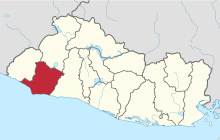Juayúa
Juayúa is a municipality in the Sonsonate department of El Salvador. It is a small town up in the mountains, founded in 1577.

The town's central plaza faces an old white cathedral that features a black Christ statue. This is a sister statue to that of the revered Basilica of Esquipulas in Guatemala, and was carved by Quirio Cantano in the late 16th century.
The town has become a tourist attraction locally and internationally, due to its scenic views and events, like the Feria Gastronomica ("food festival"). This event, which attracts hundreds of national and international tourists, is held outdoors in the central square of Juayúa. Local restaurants offer traditional dishes, including Indian chicken soup, pupusas, yuca with pork, tamales and seafood.
The city has activities on the weekends, and there is a coffee museum nearby. The surrounding area of Juayua contains several coffee farms, including the Larin finca farm.
Juayúa has well preserved colonial architecture, and art displays in its streets. The walls of the city's cafés, restaurants and shops are covered with murals painted by local artists. These range from surrealist works to realistic portraits. One of Juayúa's most well known works is La Ruta de Flores ("the route of flowers"). This is a route wherein all the walls, posts and signs lining the streets are painted with portraits, mostly of flowers.
See also
- Feliciano Ama
- 1932 Salvadoran peasant massacre
